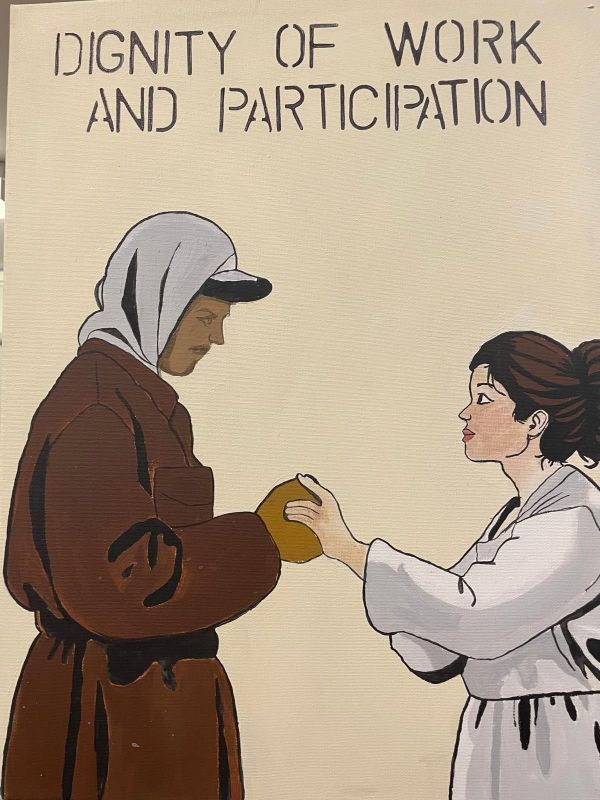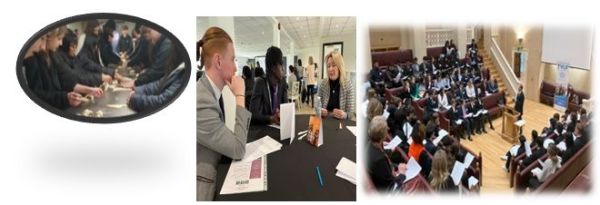Our School
Dignity of Work and Participation

Work by Oliwia Mroz
Also that everyone should eat and drink and take pleasure in all his toil—this is God’s gift to man. Ecclesiastes 3:13
At St Joseph’s we promote the dignity of work in all we do. Work is an essential part of our human dignity so everybody should be able to participate. People should always come before profit. Catholic Social Teaching holds that work is dignified and an intrinsic good and workers must always be respected and valued. The economy has to serve people not the other way around.
Work is more than a way to earn a living it is a participation in God’s creation and therefore the dignity and the rights of those who work must always be protected. Supporting the rights of workers to safe and dignified working conditions, to a work-life balance that ensures the promotion of the human person, the right to be represented by a union or similar organisation and the right to a just wage have always been a part of Catholic Social Teaching.
As we become more aware of our global responsibilities, there is need to consider whether the goods and services we buy exploit other workers in different parts of the world or prevent an equitable distribution of wealth.
“...our love should not be just words and talk; it must be true love, which shows itself in action.” I John 3:18
At St Joseph’s we promote participation in all we do. The principle of participation is the teaching that People have a right and a duty to take part in shaping a more just and human society, “...people have an obligation to be participants in the life of society and society has a duty to enable them to participate…” Catholic Bishops of the United States, Economic Justice for All, 71. ‘...the Gospel tells us constantly to run the risk of a face-to-face encounter with others, with their physical presence which challenges us, with their pain and their pleas, with their joy which infects us in our close and continuous interaction. True faith in the incarnate Son of God is inseparable from self-giving, from membership in the community, from service, from reconciliation with others. The Son of God, by becoming flesh, summoned us to the revolution of tenderness.’
Pope Francis, Evangelii Gaudium, #88, 2013
In today’s society action of Catholic Social Teaching is so important and at St Joseph’s we not only want to allow students to learn about how they can participate but we encourage them to get up and make a difference to those in society. It is through action that we can make a positive difference to others and action is encouraged in all we do.
Where is it seen at St Joseph’s?
The Catholic Social Teaching principle of the Dignity of Work and Participation is integrated throughout the curriculum, emphasizing the value and respect for all types of work and the right of individuals to participate fully in society. In Religious Education (RE), the dignity of work is introduced through the study of Genesis, where God is portrayed as a divine worker, and St. Joseph’s example as a carpenter highlights the sacredness of human labour. Students also explore workers' rights and the Catholic Church’s teaching on the responsible use of wealth.
In History, the dignity of work is examined through the struggles for voting rights and the Civil Rights Movement, illustrating how work became a symbol of equality. Geography delves into the changing nature of work and development, while in languages, students discuss job roles and the challenges of immigration and social exclusion. PSHE introduces students to the role of trade unions, multiple incomes, and workers’ rights, linking to financial systems and human rights.
Technology, Art, and Drama explore themes such as fair trade, human rights, and the moral implications of work. The study of the role of trade unions and issues like youth unemployment in Sociology and Economics further connects to the dignity of work. Overall, the curriculum emphasizes the importance of respecting workers and ensuring equal participation in society.
At St Joseph’s students explore the workplace through PSHE and encouraged to put as much effort towards their studies. We fulfil the Gatsby Benchmark and we host a Careers Fair for students.

